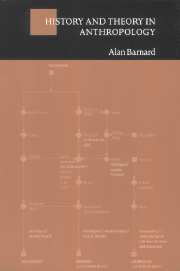Book contents
- Frontmatter
- Contents
- List of figures
- List of tables
- Preface
- 1 Visions of anthropology
- 2 Precursors of the anthropological tradition
- 3 Changing perspectives on evolution
- 4 Diffusionist and culture-area theories
- 5 Functionalism and structural-functionalism
- 6 Action-centred, processual, and Marxist perspectives
- 7 From relativism to cognitive science
- 8 Structuralism, from linguistics to anthropology
- 9 Poststructuralists, feminists, and (other) mavericks
- 10 Interpretive and postmodernist approaches
- 11 Conclusions
- Appendix 1 Dates of birth and death of individuals mentioned in the text
- Appendix 2 Glossary
- References
- Index
7 - From relativism to cognitive science
- Frontmatter
- Contents
- List of figures
- List of tables
- Preface
- 1 Visions of anthropology
- 2 Precursors of the anthropological tradition
- 3 Changing perspectives on evolution
- 4 Diffusionist and culture-area theories
- 5 Functionalism and structural-functionalism
- 6 Action-centred, processual, and Marxist perspectives
- 7 From relativism to cognitive science
- 8 Structuralism, from linguistics to anthropology
- 9 Poststructuralists, feminists, and (other) mavericks
- 10 Interpretive and postmodernist approaches
- 11 Conclusions
- Appendix 1 Dates of birth and death of individuals mentioned in the text
- Appendix 2 Glossary
- References
- Index
Summary
Melford Spiro (1992), one of several critics of contemporary cultural relativism, defines three types: descriptive, normative, and epistemological. It is useful to follow his classification, and I shall outline each briefly here.
It is a truism that cultures differ one from another. With varying degrees of enthusiasm, anthropologists since the late nineteenth century have been ‘cultural determinists’, arguing that culture itself (and not merely biology) regulates the ways in which humans perceive the world. A corollary is that cultural variability will produce different social and psychological understandings among different peoples, and this position is called descriptive relativism. Virtually all schools of anthropology entail an acceptance of at least a weak form of descriptive relativism.
Normative relativism goes a step further in asserting that, because cultures judge each other according to their own internal standards, there are no universal standards to judge between cultures. Within normative relativism, we can distinguish two logically distinct forms: cognitive relativism and moral relativism. Cognitive relativism concerns descriptive propositions, like ‘The moon is made of green cheese’, or ‘Pop music causes headaches.’ It holds that in terms of truth and falsehood, all statements about the world are culturally contingent, and therefore non-culturally-contingent statements are simply not possible. In other words, all science is ethnoscience. Moral relativism concerns evaluative propositions, like ‘Cats are more beautiful than dogs’, or ‘It is wrong to eat vegetables.’ It holds that aesthetic and ethical judgements must be assessed in terms of specific cultural values rather than universal ones.
- Type
- Chapter
- Information
- History and Theory in Anthropology , pp. 99 - 119Publisher: Cambridge University PressPrint publication year: 2000



